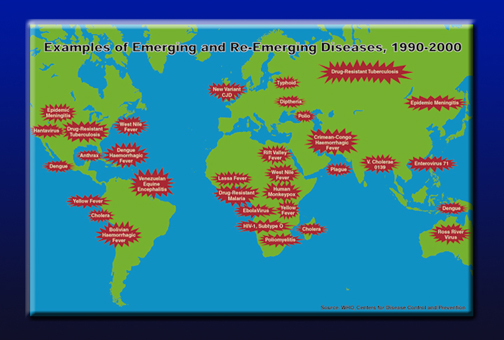News Brief
Doctors Without Borders President Demands
Global Response
by World's Nations
To Reverse the Losing Battle Against Ebola
by Doug Degroot
September 2014
September 3, 2014--Dr. Joanne Liu, International President of Medecins Sans Frontieres (MSF) [Doctors without Borders] yesterday said that "Six months into the worst Ebola epidemic in history, the world is losing the battle to contain it. Leaders are failing to come to grips with this transnational threat."
Dr. Liu made her statement in New York at a special briefing at the United Nations organized by the office of the UN Secretary General and the World Health Organisation (WHO). She noted that the previous week, WHO had projected that as many as 20,000 could be infected before the epidemic is brought under control.
 WHO, Center for Disease Control and Prevention.
Examples of Emerging and Re-Emerging Diseases, 1990-2000 Diseases mentioned on the above map: North America: Hantavirus, Drug Resistant TB, West Nile Fever; Mexico/Central America: Dengue, Anthrax; South America: Yellow Fever, Cholera, Venezuelan Equine Encephalitis, Bolivian Hemorrhagic fever; Britain: New Variant CJD (BSE); Eastern Europe: Typhoid, Diphtheria; Asia: Polio, Crimean-Congo Hemorrhagic fever,Plague, Drug-resistant TB, Epidemic Meningitis, Cholera, Enterovirus; Africa: Rift Valley Fever, West Nile Fever, Lassa Fever, Drug-resistant Malaria, Ebola Virus, Human Monkeypox, Yellow fever, Cholera, Poliomyelitis, HIV-1,subtype O; New Guinea:, Dengue; Australia: Ross River Virus. |
On the same day, the director of the U.S. Center for Disease Control (CDC), Dr. Tom Frieden, gave a press conference at the CDC headquarters in Atlanta, reporting on his recent trip to the three nations at the heart of the Ebola epidemic: Guinea, Sierra Leone, and Liberia. Frieden said the crisis was going to worsen over the next two weeks, but that there was a small window of opportunity to respond right now, with needed resources and and health care experts.
He appealed for aid to deal with the crisis, but did not call for State action as Dr. Liu did. He referred to the $20 million that USAID had put into the crisis, and called for bed nets to deal with the spike in casualties from malaria, that is going untreated because of the collapse of health care systems resulting from the Ebola epidemic, as well as appealing for private sector involvement.
A report yesterday showed President Obama responding that Ebola could eventually be beat, and told the West Africans that "our prayers are with you."
The WHO stated recently that $490 million is needed to turn the corner on dealing with the epidemic, a conservative estimate.
Dr. Liu cited as the effects of this failure of the leaders of the States of the world to deal with the crisis:
* "In West Africa, cases and deaths continue to surge."
* "Riots are breaking out."
* "Isolation centers are overwhelmed."
* "Health workers on the front lines are becoming infected and are dying in shocking numbers."
* "Others have fled in fear, leaving people without care for even the most common illnesses. Entire health systems have crumbled."
Dr. Liu noted that "It is impossible to keep up with the sheer number of infected people pouring into facilities." She continued:
"We are in uncharted waters. Transmission rates are at unprecedented levels, and the virus is spreading quickly through Liberia's capital, Monrovia.
"I stand here today, as the president of a medical humanitarian organization on the front lines of this outbreak since it emerged. My colleagues have cared for more than two thirds of the officially declared infected patients. Even as we have doubled our staff over the last month, I can tell you that they are completely overwhelmed.
"Medecins Sans Frontieres has been ringing alarm bells for months, but the response has been too little, too late. The outbreak began six months ago, but was only declared a "Public Health Emergency of International Concern" on August 8.
"While funding announcements, roadmaps, and finding vaccines and treatments are welcome, they will not stop the epidemic today.
"We have been losing for the past six months. We must win over the next three."
Dr. Liu then said that the fight against Ebola could be won, with a biological threat response by States, and a full-scale effort to build the necessary state infrastructure:
"Many of the Member states represented here today have invested heavily in biological threat response. You have a political and humanitarian responsibility to immediately utilize these capabilities in Ebola-affected countries.
"To curb the epidemic, it is imperative that States immediately deploy civilian and military assets with expertise in biohazard containment. I call upon you to dispatch your disaster response teams, backed by the full weight of your logistical capabilities. This should be done in close collaboration with the affected countries.
"Without this deployment, we will never get the epidemic under control.
* "The following must be prioritized:
* "Scaling up isolation centers;
* "Deploying mobile laboratories to improve diagnostic capabilities;
* "Establishing dedicated air bridges to move personnel and equipment to and within West Africa;
* "Building a regional network of field hospitals to treat suspected or infected medical personnel."
Dr. Liu described this bio-defense team effort as the first step. In addition, she said:
"We must also address the collapse of state infrastructure. The health system in Liberia has collapsed. Pregnant women experiencing complications have nowhere to turn. Malaria and diarrhea, easily preventable and treatable diseases, are killing people. Hospitals need to be reopened, and newly created."
She asserted that UN member states should not focus on coercive measures to defend their own borders this would drive people underground, leading to concealment of cases, thereby pushing the sick away from the health system, preventing containment of the virus.
The Ebola crisis is transnational, with social, security, and economic implications for Africa and the world. Dr. Liu concluded:
"It is your historic responsibility to act.
"We cannot cut off the affected countries and hope this epidemic will simply burn out. To put out this fire, we must run into the burning building."
